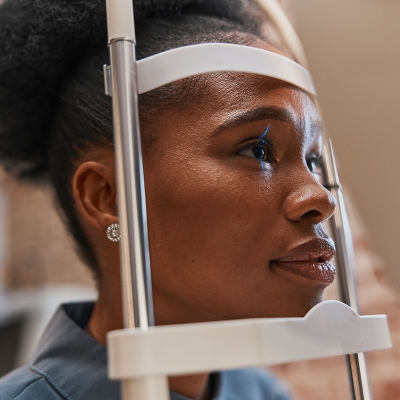10 medications that can affect your vision
Whether you take medication to ease occasional headaches or a chronic condition, they may cause unpleasant side effects to your eyes. Here’s what you need to know.

A bad headache or stuffy nose may have you running to the medicine cabinet, but that relief can sometimes come with a tradeoff. Many over-the-counter (OTC) and prescription medicines have side effects that can impact your body in a variety of ways — and your eyes are no exception.
“While most side effects are minor, like mild dryness or itchiness, several types of medications can lead to more serious issues, particularly after extended usage,” says Ronald L. Benner, O.D., president of the American Optometric Association. “It’s important to let your doctor of optometry know not only your prescription medications but also the OTC meds and vitamins that you are taking as well.”
Side effects can vary from person to person, says Dr. Benner. Common eye-related side effects include:
- Blurry vision
- Changes in color perception
- Decreased peripheral vision
- Double vision
- Dry eye
- Inflammation of the optic nerve (the nerve that connects the eye to the brain)
- Light sensitivity
- Shadows or blank spots in vision
- Slowed focusing
Here are 10 medications — OTC and prescription — that could be affecting your eyes, plus how to find relief.
Stay on top of your eye health with an in-network provider. Search for an eye care provider now.
NSAIDs
The long name is nonsteroidal anti-inflammatory drugs. These are drugs that can help treat inflammation, pain and fever. You might recognize some of their names: ibuprofen (Advil, Motrin), naproxen (Aleve) and aspirin (Bayer).
When a backache or menstrual cramps show up, this medicine is a go-to treatment, but you may develop side effects if you take large doses of NSAIDs, or if you take them for a long time. That means people who rely on these medications to help treat chronic pain are more at risk of vision side effects, including:
- Blurred vision
- Light sensitivity
These symptoms are most common in the first few weeks of treatment, but they usually resolve once your body adjusts to the medication.
Blood thinners
A small bruise on your leg is no big deal. But when one shows up in your eye, it can look serious.
“With blood thinners, we have an increased risk of waking up in the morning with a big old bruise in the white part of the eye,” says Chantal Cousineau-Krieger, M.D., an ophthalmologist at the National Eye Institute.
Even aspirin — a blood thinner — can turn a small hemorrhage into a bigger one. Dr.Cousineau-Krieger says she’s had patients come in scared with a blood-red eyeball. “But it is just a bruise, and it fades over a week or two,” she says.
Antihistamines
Antihistamines help relieve cold and allergy symptoms. The trade off? They can contribute to dry eye.
Dry eye is when your eyes don’t make enough tears to stay wet or your tears don’t work correctly. It can leave you feeling uncomfortable. Sometimes it can even lead to vision problems.2
This makes sense. Antihistamines help dry up excess mucous so you can breathe easier,3 but that drying-up effect can lead to dry eye and dry mouth.3
“You want certain things dry — like you’d love it if your nose stopped running — but you didn’t intend to end up with dry eye,” says Dr. Cousineau-Krieger.
To help soothe dry eye, Dr. Cousineau-Krieger suggests using a warm compress on the eye, as well as taking breaks from looking at screens and using a humidifier in your bedroom. You can also use artificial tears to help lubricate your eyes.
Steroids
Corticosteroids, also known as steroids, help control inflammation. They’re prescribed to help treat certain diseases, such as lupus and multiple sclerosis, but they can cause serious eye-related side effects. That’s because corticosteroids can increase pressure in the eye, which can lead to damage of the optic nerve.4
Dr. Benner says that some corticosteroids — specifically oral steroids and steroid eye drops — can contribute to the development of cataracts and glaucoma after years of use. That includes long-term use of corticosteroids like:
- Prednisone
- Prednisolone
- Betamethasone
For these reasons, steroids are typically only prescribed for the short term. If you have a chronic condition that requires you to take them long term, be sure to stay on top of your annual eye exams. Your optometrist can monitor your eye-related side effects and help protect your vision.
Antidepressants and antianxiety medication5
Finding a medication that effectively treats your depression or anxiety can be a huge relief, but these meds can also mess with your eye health.
There are a whole host of drugs that can help with mental health disorders, such as:
- Antidepressants, including selective serotonin reuptake inhibitors, or SSRIs, and serotonin and norepinephrine reuptake inhibitors, or SNRIs
- Antipsychotics
- Benzodiazepines
While your mood may improve, you may notice some unpleasant eye symptoms after taking these medications. Symptoms might take a few days to a few weeks to arise.
Some of the common eye and vision side effects from these medications include:
- Blurry vision
- Dilation (enlarging) of the pupil
- Dry eye
- Increased risk of more serious eye conditions
Isotretinoin to treat acne6
Isotretinoin is a commonly prescribed acne medication. Eye complications during and after use of this drug have been highly reported. Isotretinoin can affect different parts of the eye in different ways, including:
- Cornea (inflammation of the dome-shaped tissue on the front of the eye)
- Eyelid (problems with inflammation)
- Gland changes (resulting in dry eye)
- Vision changes and discomfort (blurry or reduced sight)
These symptoms can happen within days or up to several years after use. It’s a good idea to keep a list of all the medications you take so you can refer to it while trying to diagnose tricky eye symptoms.
Antibiotics and tuberculosis treatments7
Tuberculosis (TB) is one of the world’s leading infectious disease killers, with as much as an estimated one-quarter of the world’s population infected. The kind of bacteria that causes TB is called mycobacterium tuberculosis.
Certain antibiotics are commonly prescribed to treat TB, but they can have vision side effects, including:
- Color blindness
- Decrease in visual sharpness
- Loss of vision
Dr. Cousineau-Krieger says that certain antibiotics used to treat TB can cause damage to the optic nerve. “Patients that are on them do require routine screening to make sure that their optic nerve remains healthy for the very, very long duration of treatment,” she says. Most patients have to take medication for 9 months to a year to effectively treat TB.
Hydroxychloroquine (Plaquenil)8
This drug is an anti-inflammatory medicine. It can help treat conditions such as rheumatoid arthritis, lupus and other autoimmune diseases.
While your joints may rejoice after taking this medication, your eyes may not. Hydroxychloroquine can cause eye toxicity, potentially leading to retinal damage.
Symptoms of toxicity can include:
- Difficulty reading
- Flashing lights
- Glare
- Metamorphopsia (causes images to appear warped or distorted, such as straight lines appearing wavy)
- Missing central vision
- Reduced or blurred vision
- Visual color decrease (specifically red objects)
“The longer you take it, the higher the risk is,” says Dr. Cousineau-Krieger. Patients who take this medication should be getting annual screenings, with a particular focus on the retina, she says. The goal is to make sure the medication is not causing any problems.
Elmiron (pentosan polysulfate) for bladder pain9
This medicine is used to treat a painful bladder condition, but it can lead to serious side effects and cause damage to the retina.
It’s a good idea to tell your eye doctor that you’re on this medication. You’ll want to keep an eye out for these side effects in the first few years of taking Elmiron:
- Blurred vision
- Difficulty reading
- Your vision taking longer to adjust to low or reduced light
Regular eye exams that include looking at the retinal area are recommended to detect any issues early on.
Medication for erectile dysfunction10
People with erectile dysfunction (ED) may be prescribed certain drugs to treat their condition. These include vardenafil, tadalafil and sildenafil. And while they may help alleviate ED symptoms, they can spell trouble for your eyes.
Some common ED medication side effects include:
- Blurry vision
- Decreased color vision
- Difficulty telling certain colors apart, such as blue and green
- Having a blue-green tinge to your vision
- Light sensitivity
Luckily, these side effects are typically temporary and should resolve within a few days to a few weeks. If they don’t, it’s a good idea to visit your prescribing doctor and optometrist.
How to find relief
As soon as you notice an eye issue, it’s a good idea to visit your optometrist. “All symptoms should be treated as urgent until viewed by a doctor of optometry,” says Dr. Benner. “This is the best way to combat potentially severe complications, including vision loss.”
Be sure to tell your eye doctor about any medications you’re taking, says Dr. Benner. “People don’t always connect their vision changes to their medications,” he says. “Sharing an up-to-date list of current and previous medications at the time of your visit can help produce an accurate diagnosis.”
Switching to an alternative medication may help relieve eye symptoms. If that isn’t an option, your eye doctor can help you come up with a treatment plan to ease your discomfort.
Looking for a new eye care provider? Search the UnitedHealthcare Vision Network now.
Sources:
- NSAIDs (nonsteroidal anti-inflammatory drugs) Cleveland Clinic, last reviewed July 2023. Accessed September 8, 2023.
- Causes of dry eye National Eye Institute, last updated December 2020. Accessed September 8, 2023.
- Effects of oral antihistamines on tear volume, tear stability, and intraocular pressure Vision (Basel), June 2020. Accessed September 8, 2023.
- Ocular manifestations of corticosteroids American Academy of Ophthalmology, May 2023. Accessed September 8, 2023.
- A review of ocular complications associated with medications used for anxiety, depression, and stress Clinical Optometry, February 2022. Accessed September 8, 2023.
- Ocular manifestations of isotretinoin American Academy of Ophthalmology, August 2022. Accessed September 8, 2023.
- Ophthalmologic findings related to tuberculosis American Academy of Ophthalmology, June 2023. Accessed September 8, 2023.
- Hydroxychloroquine toxicity American Academy of Ophthalmology, June 2023. Accessed September 8, 2023.
- ELMIRON - pentosan polysulfate sodium capsule, gelatin coated Daily Med, last revised November 2022. Accessed September 8, 2023.
- Erectile dysfunction medication and your eyes and vision American Academy of Ophthalmology, August 2022. Accessed September 8, 2023.


